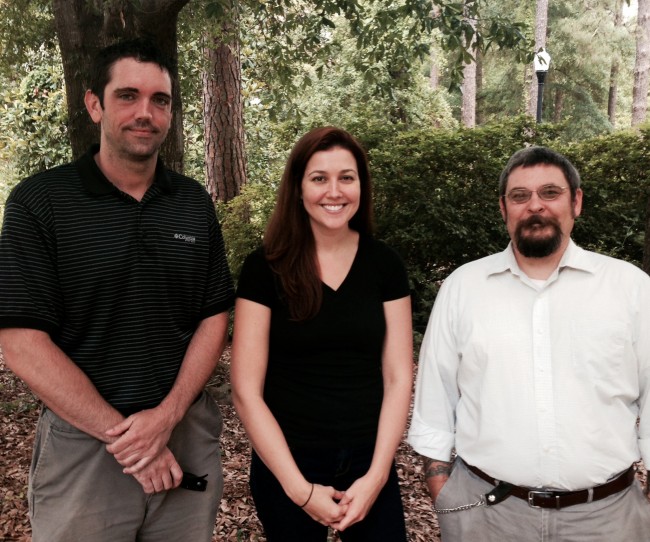University Researchers Study Wilderness Therapy for PTSD

Zachary Dietrich, Dr. Shauna Joye and Joseph Amos Garcia pose for a photo near the psychology department at Georgia Southern University. The team of researchers have partnered with Warrior Hike “Walk Off The War” Program, to study thru-hiking – walking an entire long-distance trail in one attempt – as an alternative method of therapy for combat veterans suffering from post-traumatic stress disorder.
Georgia Southern University researchers have partnered with the Warrior Hike “Walk Off The War” Program, to study thru-hiking as an alternative method of therapy for combat veterans suffering from post-traumatic stress disorder.
The purpose of the research is to expand literature on the benefits of wilderness experience programs and wilderness therapy by determining if a thru-hike – walking an entire long-distance trail during one attempt – allows veterans to process their combat experiences and alleviate PTSD.
“Today’s veterans can literally be in a combat zone one day and within hours they’ll be at home with their families,” said Zachary Dietrich, researcher and Marine Corps veteran. “It isn’t like wars past when it took weeks to get back home and they had time to adjust.”
The program is a six-month, 2,000-plus mile journey through one of three National Scenic Trails – the Appalachian, Continental Divide and Pacific Crest. Combat veterans who thru-hike the Appalachian Trail begin at Springer Mountain in northern Georgia and end at Mount Katahdin in Maine covering a total of 2,185 miles on their long-distance journey.
“We’ve found that the main things they benefit from during the hike are long periods of isolation, reflection and time inside of their own head,” said Dietrich who is pursuing his Doctor of Clinical Psychology degree at Georgia Southern. “As researchers, we’re trying to see if there’s a way we can direct those thoughts a bit and maximize the benefits of the experience.”
A team of researchers hiked alongside the veterans for several days to gain a better understanding of the alternative therapy.
“We hiked with them for more than 20 miles,” said Shauna Joye, Ph.D., Air Force veteran and Georgia Southern professor. “I think that hiking with them showed that psychologists aren’t just about the couch mentality. We just chatted with them and they ended up bringing up things they’ve experienced.”
University researchers will continue to work with the Warrior Hike program by providing psychoeducation to veterans as they hike the trail. This will aid in determining whether adding a therapy component can enhance the benefits of a wilderness experience.
“New ideas need to start being generated and that’s kind of what we’re hoping to do,” said Dietrich who added that he appreciates the University supporting his PTSD research.
“Between my bachelor’s and master’s degrees, this is my fourth university and I could not have done this research anywhere else,” said Dietrich. “PTSD affects a lot of people at one point or another and it’s something we all need to be aware of.”
The results of the study will be used to evaluate the long-term effectiveness of wilderness experience programs and their value to combat veterans.
Three-time combat veteran, Sean Gobin, founded the Warrior Hike Program in 2012 after he hiked the Appalachian Trail to “walk off the war.”
In 2010, U.S. Congress declared June 27 National PTSD Awareness Day as a means to raise public awareness for PTSD and its effective treatments to assist those affected by the disorder.
Posted in Archive, University Homepage

